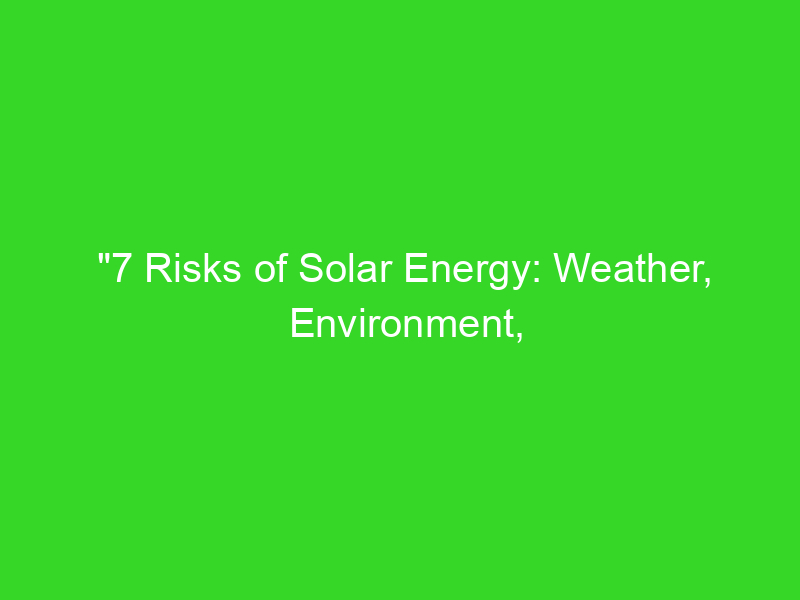
Risks of Solar Energy
Solar energy is an excellent source of renewable energy that can help reduce environmental pollution and dependence on fossil fuels. However, just like any other source of energy, solar energy has its risks, which need to be considered before investing in solar technology. In this article, we will discuss the various risks associated with solar energy.
1. Weather Dependence
One of the primary risks associated with solar energy is its dependence on weather conditions. Solar panels require sunlight to produce electricity. Hence, a lack of sunlight during cloudy or rainy days can significantly reduce the efficiency of the solar panels. This factor needs to be considered when designing solar power plants and installing solar panels.
2. Environmental Risks
Although solar energy is a cleaner and greener source of energy, the manufacturing process of solar panels can have environmental risks. The production of solar panels involves the use of hazardous chemicals such as cadmium and lead. These chemicals can be harmful to human health and the environment if not disposed of correctly. Therefore, it is essential to ensure that solar panel manufacturers follow proper disposal guidelines to minimize the environmental risks involved.
3. Maintenance and Repair Costs
Solar panels require regular maintenance to ensure maximum efficiency. The costs associated with maintaining and repairing solar panels can sometimes be high. Hence, it is essential to factor in the maintenance and repair costs when investing in solar technology.
4. Reliability Issues
Solar panels are relatively new technology, and their long-term reliability is still unknown. The lifespan of a solar panel is around 25 years. However, the actual lifespan can vary based on several factors such as weather conditions, maintenance, and manufacturing quality. Hence, there is a risk that the solar panels may not last as long as expected, which can result in additional costs.
5. Cybersecurity Risks
Solar energy systems are vulnerable to cyber threats, just like any other computer-based technology. A cyber attack on a solar energy system can result in the system's failure, which can cause significant financial losses. Therefore, it is essential to ensure that solar energy systems have adequate cybersecurity measures in place to prevent cyber attacks.
6. Property Damage Risks
Solar panels are usually installed on roofs or in open fields, which can make them vulnerable to weather events such as strong winds, hail, and storms. These events can cause damage to the solar panels, resulting in repair or replacement costs. Therefore, it is essential to consider the potential weather risks before installing solar panels.
7. Financing Risks
Investing in solar technology requires significant upfront costs, which can be a considerable risk for some individuals or businesses. Additionally, government incentives and tax credits for solar energy can change over time, resulting in uncertainty about the returns on investment. It is essential to consider the financing risks before investing in solar technology.
In conclusion, solar energy is a promising source of renewable energy with several benefits. However, it is important to consider the various risks involved before investing in solar technology. By understanding and mitigating these risks, individuals and businesses can make informed decisions about investing in solar energy.





